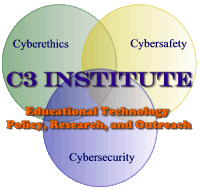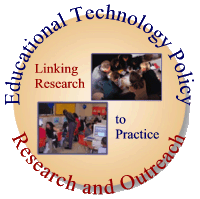

![]()
![]()
![]()
![]()
![]()
![]()
![]()
![]()
![]()
C3™ Institute Goal 2:
Provide guidance to parents, educators, students and policy makers regarding effective strategies, techniques and protocols to assist educators and young people in gaining the knowledge and skills about ethical, legal, safety, and security implications of technology use
There continues to be a need for providing guidance and distributing information to parents, educators, students and policy makers regarding effective strategies, techniques and protocols to assist themselves and young people in gaining the knowledge and skills about ethical, legal, safety, and security implications of technology use.
C3™ Institute Goal 2 Initiatives:
- Roundtable Series: Partnering with The National Cyber Security Alliance (NCSA) and other supporting partners a roundtable series focusing on developing a “National Cyber Security, Safety, and Ethics Awareness Campaign,” was developed to decrease and eventually eradicate cyber crimes against children and teenagers, and increase national awareness about proper Cyber Security, Safety and Ethical Uses of technology and the Internet in today's setting [More]
- C3™ Resource Portal: The C3™ Institute maintains a portal of resource links to organizations, curricula, list serves, forums, papers, articles, surveys and much more related to Cyberethics, Cybersafety and Cybersecurity. [More]
- Standards: The C3™ Institute
serves on several Maryland State Advisory Committees and Working Groups
to develop teacher, administrator
and
student technology standards
- Maryland Teacher Technology Standards (MTTS)
- Draft MTTS/TSSA standards [Word ... PDF]
- Maryland Teacher Technology Standards Online
- MTTS Official PDF
- Students: Technology Literacy by 8th Grade
- Technology Standards for School Administrators (TSSA) Collaborative
- Maryland Teacher Technology Standards (MTTS)
- Educator Technology Profile Initiative: Lack of PD for technology use is one of the most serious obstacles to fully integrating technology into the curriculum. Yet traditional sit-and-get training sessions or one-time-only workshops have not been effective in making teachers comfortable with using technology or adept at integrating it into their lesson plans (NCREL). Furthermore, all teachers do not need the same training. In the day and age of "lifelong learning" being able to quickly, at your own time and pace, find your competencies and areas of need would be helpful. In this effort, this initiative has been working with several projects on different methods to allow teachers and administrators gather individual profiles about their technology competencies. We are (1) working with the Online Technology Profile for Teachers and Administrators' Consortium to help develop and pilot a profile instrument related to the MTTS. (2) As with many other colleges of education, we are interested in how to measure candidate readiness towards technology "knowledge" as well as how to monitor student's competencies towards the technology standards for program review. We are part of an ISTE/IC3 NET*S Candidate Readiness Benchmark Performance Assessment pilot. (3) We are developing our own technology profile instrument, as well as self paced tutorials available to all college of education faculty, staff and students. (4) Finally, we have developed a portal for online assessment instruments (knowledge and attitude).
- Committee on Library Information Literacy and Ethical Use
within the Maryland Partnership for Teaching and Learning, K-16. At
the February 2005 meeting of the K-16 Workgroup, K-12 and higher education
faculty presented on the need for a statewide dialogue on library information
literacy and ethical use for the purposes of developing policies that
impart to Maryland’s K-12 and higher education students:
- The importance of academic integrity and ethical use
- The destructive impact of plagiarism on student achievement
- The significance of library information literacy and its correlation to student success
- Research: The C3™ Institute has been actively engaged in studying the issues, problems, and relationships associated with Cyberethics, Cybersafety and Cybersecruity in the K-16 setting. Specifically, we have done extensive work exploring the perceptions, conceptualizations and practices of teachers and students in regards to C3 content and have developed a database of case study scenarios.
| Copyright © 2007 Educational Technology Policy, Reserach, and Oureach, Inc. http://www.edtechpolicy.org dpruitt@umd.edu |
 |